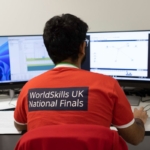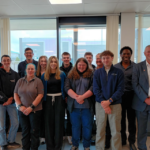Huge congratulations to the thousands of young people across the country picking up their GCSE results today. It’s a day for celebration, a day to share with friends and family and a step further into a bright future.
The young people we see on our TVs, phones and tablets today, born in 2000 and 2001, have only ever known the 2000s. They are the most technologically savvy and IT literate generation ever. Some of them will live into the 2100s – the whole century really is ahead of them. Making the right choices now will ensure they are able to apply themselves in the fourth industrial revolution we’re currently living through and the fifth and sixth to come. We need all the skills of these young people to ensure that the UK continues to grow and develop.
So when I was asked to think about what advice I would give to young people thinking about what to do next, the words of Danny Hoang came to me. Danny won a gold medal in an international WorldSkills competition – his passion for cooking took him from his parents’ takeaway in South East London to a dream job at one of New York’s top restaurants. At a reception in the House of Commons last year, Danny said something that has really stuck with me: ‘there is more than one way to be smart’. These words capture our philosophy at WorldSkills UK. With your GCSEs you can do so much. You can start a job, study further, take up an apprenticeship. Whatever you do the thing to remember is it’s your passion, your skills, your future that matters. There’s no monopoly on smart.
I was reminded of this again over the weekend when reading in the Sunday Telegraph what another of our gold medallists, Ashley Terron, said his teacher told him after he’d got his GCSEs – which were really good. Ashley had his heart set on being an apprentice bricklayer. His teacher pulled him to one side and said ‘What are you doing? You’re better than that’. Such out-of-touch advice, which still sadly passes for careers advice in many of our schools, is out of step with Generation Z. The time when A-levels were the only options for smart young people is so nineties – so last century.
With the increasing focus on apprenticeships and technical careers, there is a skills revolution brewing which will hopefully sweep away the old-fashioned attitudes of those with a 19 in front of their birth year. A-levels are great if you want to be a historian; less so if your passion is for games design. Also in the Sunday Telegraph this past weekend was Dan McCabe. Dan’s a member of Team UK, preparing to take part in WorldSkills Abu Dhabi in less than two months’ time. At school he wanted a career in games but his expectation was of an office job. West Cheshire College put him on a path to gold medals at the UK national finals and the European finals, a seat on the plane to the global finals and a job at Codemasters. Dan told the Sunday Telegraph that his involvement in skills competitions ‘reinvented me into someone I didn’t think I could be’.
These experiences have made Danny, Ashley and Dan role models for a generation – along with the rest of the young women and men who have already, or are about to, represent the nation in Team UK. Our mission at WorldSkills UK is to get their voice heard in schools in England, N. Ireland, Scotland and Wales so that they can help transform the lives of others, the way their lives have been transformed. Our work with the Careers & Enterprise Company in schools in England trialling peer-to-peer careers advice has resulted in 76% of young people studying for GCSEs feeling more motivated and inspired about their futures. Relevant, real and relatable experience is the key to informed career choices.
So, the best advice I can give today is to listen to Danny, Ashley and Dan. They know what they’re talking about.


